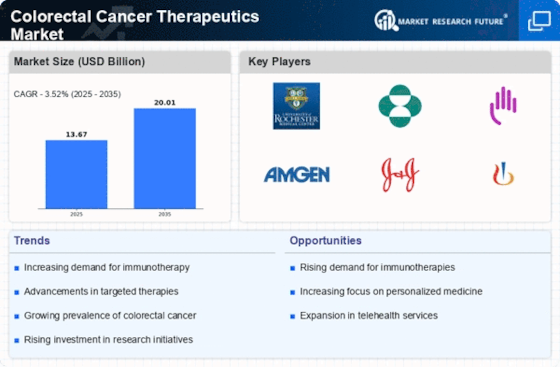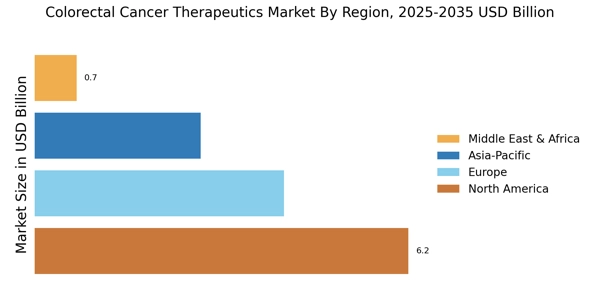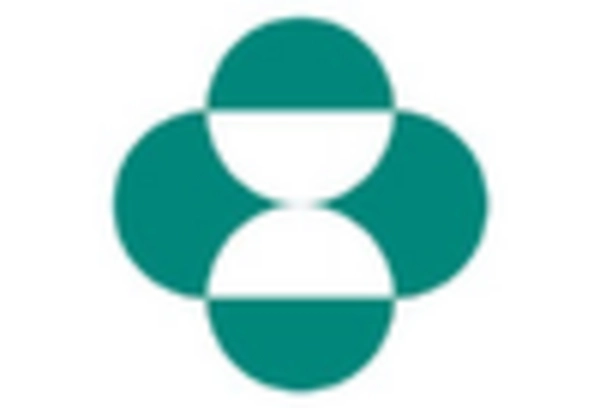Advancements in Precision Medicine
Advancements in precision medicine are reshaping the landscape of the Colorectal Cancer Therapeutics Market. The integration of genomic profiling and biomarker testing allows for the identification of specific mutations and characteristics of tumors, enabling tailored treatment approaches. This shift towards personalized therapies has shown promising results in improving patient outcomes and minimizing adverse effects. The market for targeted therapies, which are designed to attack cancer cells based on their genetic makeup, is projected to grow significantly. As of 2025, the targeted therapy segment is expected to account for a substantial share of the overall market, reflecting the increasing preference for precision medicine in colorectal cancer treatment. This trend underscores the importance of ongoing research and development in the Colorectal Cancer Therapeutics Market.
Rising Investment in Cancer Research
The surge in investment for cancer research is a crucial driver for the Colorectal Cancer Therapeutics Market. Governments and private organizations are allocating significant funds to support research initiatives aimed at discovering novel therapies and improving existing treatment modalities. In recent years, funding for colorectal cancer research has seen a marked increase, with billions of dollars directed towards clinical trials and innovative treatment strategies. This financial backing not only accelerates the development of new drugs but also enhances collaboration between academic institutions and pharmaceutical companies. As a result, the Colorectal Cancer Therapeutics Market is likely to benefit from a robust pipeline of new therapies, which could lead to improved patient outcomes and expanded treatment options.
Emergence of Novel Therapeutic Agents
The emergence of novel therapeutic agents is transforming the Colorectal Cancer Therapeutics Market. Recent years have witnessed the introduction of innovative drugs that target specific pathways involved in cancer progression. These agents, including monoclonal antibodies and small molecule inhibitors, have demonstrated efficacy in clinical trials, leading to their approval for use in treating colorectal cancer. The introduction of these therapies not only expands the treatment arsenal available to oncologists but also provides patients with more options for managing their disease. As research continues to unveil new targets and mechanisms of action, the Colorectal Cancer Therapeutics Market is poised for further growth, driven by the continuous influx of groundbreaking therapeutic agents.
Growing Awareness and Screening Programs
The growing awareness of colorectal cancer and the importance of early detection are pivotal factors driving the Colorectal Cancer Therapeutics Market. Public health campaigns and educational initiatives have significantly increased knowledge about the disease, leading to higher screening rates. As more individuals undergo routine screenings, the number of early-stage diagnoses is expected to rise, creating a larger patient population in need of therapeutic interventions. This trend is likely to stimulate demand for various treatment options, including surgical procedures, chemotherapy, and targeted therapies. Furthermore, the establishment of screening programs in various regions is anticipated to enhance access to care, thereby positively impacting the Colorectal Cancer Therapeutics Market.
Increasing Incidence of Colorectal Cancer
The rising incidence of colorectal cancer is a primary driver for the Colorectal Cancer Therapeutics Market. According to recent statistics, colorectal cancer ranks as the third most common cancer worldwide, with an estimated 1.9 million new cases reported annually. This alarming trend necessitates the development and availability of effective therapeutic options. As the population ages, the risk of developing colorectal cancer increases, further amplifying the demand for innovative treatments. The growing awareness of screening and early detection also contributes to the increasing number of diagnosed cases, thereby propelling the market forward. The need for effective management strategies and therapies to address this growing patient population is likely to stimulate investment and research in the Colorectal Cancer Therapeutics Market.

















